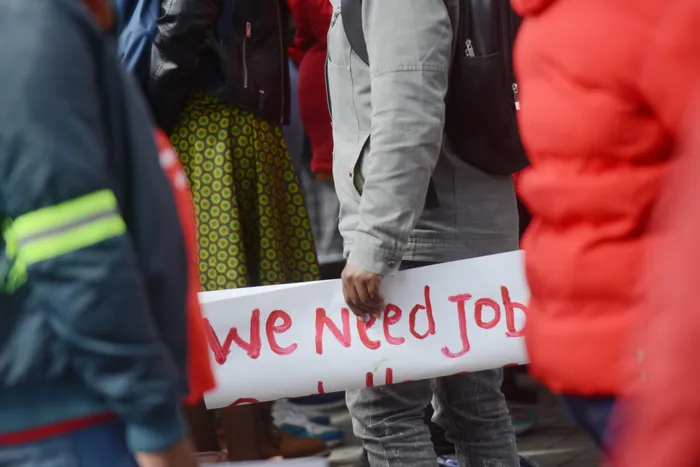ANC fails to address unemployment in South Africa

Picture: Armand Hough/African News Agency (ANA)/Taken August 24, 2022 – SAFTU, COSATU, and various other union groups marched to the Civic Centre and Provincial Legislature over the worsening socio-economic conditions for the working class and the marginalised poor communities.
By Stanley Muravha
Unemployment in South Africa is a serious issue that is directly affecting about 7.2 million of people. Not to forget the rest of people that they are being affected by its indirect consequences such as crimes. Yet, the ANC government is failing to address it effectively; rather it is burying its head in the sand. A person is considered unemployed if that person is between the age of 15-34 without a job, but actively seeking work, willing and able to work. There are also those who have just given up in looking for a job, because they have been trying and failing to get a job.
Former President Thabo Mbeki took a swipe at President Cyril Ramaphosa saying that, there is no national plan to address the issue around unemployment, poverty and inequality. He further said that, so many people are unemployed and poor in South Africa and as a country, “We do not have a great national plan to address these challenges.”
It was only in 2008 that South Africa under democracy had the lowest rate of unemployment which was at 21.50 percent. Since then, we are experiencing a significant increase in the unemployment rate. In the fourth quarter of 2022, the unemployment rate was at 32.7 percent, which can be considered the lowest figure since the first quarter of 2021 which was at 32.9 percent. In the fourth quarter of 2022, the youth unemployment rate rose to 61 percent, which is more than 59.6 percent of 2019 and 2020.
The increase in the unemployment rate since 2019 has been attributed to the impacts of the Covid-19 pandemic, which we all know affected many businesses. However, the Covid-19 pandemic cannot be solely scapegoated while there are other factors such as corruption. During the Covid-19 pandemic, intense government corruption has occurred, where an estimation of R27 billion has been lost due to corruption under the ANC government. This embezzled fund could have been useful in curbing unemployment if they were to be utilised in the stabilisation of some businesses that were crumbling. Mbeki has accused Ramaphosa of failing to fulfil his promise to reduce government corruption.
Not only did Mbeki accuse Cyril Ramaphosa of corruption, but he also said, ANC is characterised by corrupt leaders. He analysed the issue around unemployment, poverty and inequality in South Africa and said that, if the current rate of unemployment, poverty, and inequality, continues to persist; we may experience a violent uprising similar to that of the 2011 Arab uprising.
Since 2019, the ANC government promised to create 1.3 million jobs over the next five years and 275000 jobs every single year. However, statistically, the unemployment rate keeps on skyrocketing every year, and nothing has happened so far. ANC government is known to be notorious for making promises and never fulfil what it has promised. In every election, it promises to address the issue around inequality, unemployment and poverty, but after we invest our power in them, they sit at the top and do nothing. As the Economic Freedom Fighter (EFF) leader Julius Malema said, nothing is working under Cyril Ramaphosa: It is very irresponsible of a man to be on top and doing nothing.
In the 2023 State of the Nation Address (SONA), Ramaphosa said, “the government does not create jobs, businesses create jobs”. He emphasised, that, the key task of government is to create a conducive environment that enables businesses to prosper. Nevertheless, how are they creating that conducive environment if we are still amongst the countries with the highest protest, crime and corruption, not to forget the issue around electricity, which is affecting many businesses to operate effectively? Therefore, the ANC is creating an environment that is sustaining unemployment by hindering business prosperity.
Many analysts of unemployment, including Lianda Dzikiti, Llewellyn Leonard, Tshishonga Ndwakhulu, and Jeremy Seekings argue that South African unemployment is multifaceted and complex. It is built around systematic and structural factors such as limited access to education and skills, inequality and a weak labour market. Some of these factors can be attributed to the historical legacy of apartheid that resulted in inequality and many black South Africa living in poverty.
The high level of unemployment in South Africa is also being caused and sustained by our leaders who are not well informed about steps to address the country’s high levels of unemployment and, leaders who lack abilities to govern a country effectively.
Stanley Muravha is a tutor in the Department of Sociology at the University of Johannesburg, and a Masters's candidate in Sociology